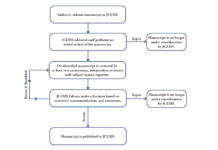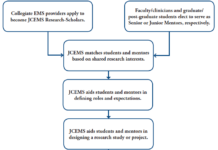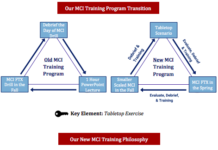Do EMT students enrolled through a college course perform better in terms of course...
Armstrong et al. conducted a retrospective review comparing course completion rates and state-certifying exam scores for college-affiliated and non-college-affiliated students enrolled in an EMT course.
Integrating Continuing Education Credits to a Collegiate EMS Training Model
The University of Pennsylvania Medical Emergency Response Team implemented a program to integrate continuing medical education (CME) credits into their training curriculum.
Embry Riddle Aeronautical University Emergency Response Team hosts a multi-agency active shooter drill based...
Connor Black, the Assistant Chief of the Emergency Response Team (ERT) at Embry-Riddle Aeronautical University, sat down with the JCEMS news...
Illinois Institute of Technology creates on-campus EMS organization with initial focus on community CPR/AED...
Current student Alexandra Montgomery leads the charge to develop a new campus EMS organization.
Peer Review of Collegiate EMS Scholarly Literature
JCEMS employs a double-blind peer review process to filter manuscripts for publication. We believe that the process minimizes bias, promotes fairness, encourages appropriate criticism, and strengthens the quality of submitted manuscripts.
Non-Veterinary Emergency Care of Law Enforcement Canines at Mass Gathering Events
This case report describes the development, implementation, and evaluation of a pilot training course for collegiate EMS providers on the treatment of law enforcement canines.
The JCEMS Research Mentorship Program
JCEMS developed a Research Mentorship Program to build research capacity in the collegiate EMS community.
Implementation of Stop the Bleed on an Undergraduate College Campus
Johns Hopkins Emergency Response Organization (HERO) implemented a training, preparedness, and public access equipment program to stop the bleed on their campus.
MCI Training Program
In 2010, the University of Pennsylvania Medical Emergency Response Team (MERT) initiated the Mass Casualty Incident (MCI) training program. To better prepare student-EMTs to respond and manage a disaster scene, MERT is implementing a tabletop exercise module to ensure that MERT members are fluent in the Incident Command System (ICS), familiar with the MERT MCI operating guidelines, and able to size-up a scene appropriately.
Implementing Stop the Bleed at Skidmore College
Skidmore College Emergency Medical Services (SCEMS) implemented a Stop to Bleed campaign at Skidmore College. SCEMS organized 20 free bleeding control trainings to train over 60 community members and incorporated $5,000 into the Skidmore Campus Safety 2018 budget for bleeding control equipment.


















